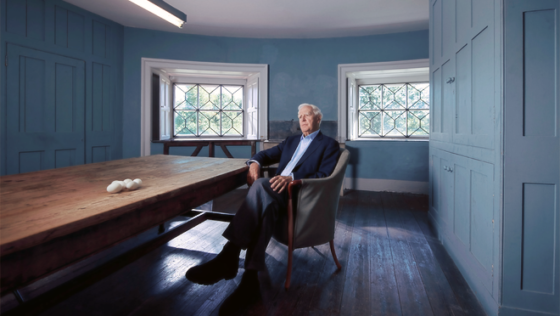TIFF 2023 | The Pigeon Tunnel (Errol Morris, UK) — TIFF Docs

By Robert Koehler
It is good to witness John le Carré rising from the dead for a final, rare, and elaborately staged interview with filmmaker Errol Morris in The Pigeon Tunnel, an odd kind of audio-visual accompaniment to Le Carré’s autobiographical book, subtitled Stories from My Life, and published in 2016, four years before his December 2020 death. The Guardian’s Robert McCrum has accurately described the book as “rag-bag” and a “strange, occasionally hilarious, patchwork memoir,” and it may have been Le Carré’s desire to expand upon and smooth the book’s rough edges that he sat down with Morris. What Le Carré may not have known—or maybe he did?—was Morris’ own, insistent desire to insert himself into the novelist’s personal story. Thus, the movie begins on the wrong note, with Morris (always off-screen, his disembodied voice sounding like it was recorded on another planet) fomenting an artificial “drama” with him as “interrogator” and Le Carré as his antagonistic subject. One senses in Le Carré’s smirk at this silly provocation what he really thinks about this line of questioning, and has to admire the author’s diplomatic manner approaching Morris. He reminds that this interview-as-film is, after all, a piece of “performance art.”
Far more interesting than anything Morris does—including several archly-staged re-creations of memories and his artsy-fartsy camera angles on Le Carré as he speaks—is what his subject says. Now, none of this is new to any reader of the memoir; Le Carré doesn’t reveal anything here that he didn’t lay out there, and, if anything, the movie misses out on addressing his father’s violent abuse that Le Carré and his mother experienced, as well as his undying resentments toward the British literary world for never taking him seriously as an artist. Which is why the viewer, unaware of this professional battle the best-selling spy-thriller writer waged with critics for decades, will be puzzled when, out of nowhere, Le Carré declares to the camera, “I am an artist.” This, one realizes, is the reason why the legendarily secretive author, who rarely gave interviews, wanted to subject himself to Morris: To have the last word on the issue of his literary accomplishments and status. It’s of a piece with his outsider identity, the son of a free-wheeling confidence man and a loveless mother who abandoned her family after tiring of her impossible husband, schooled at Oxford but never of the Oxfordian class of elites, always one bad decision away from being a criminal himself. Perhaps feeling curtailed by his well-earned status as the best commercial novelist in English since World War II, Le Carré gets to declare here that he was always more than that. He leaves behind a great, entertaining bibliography, and many intriguing notions on betrayal, the duplicitous self, and the artist’s perhaps unavoidable schizoid nature.
Robert Koehler

